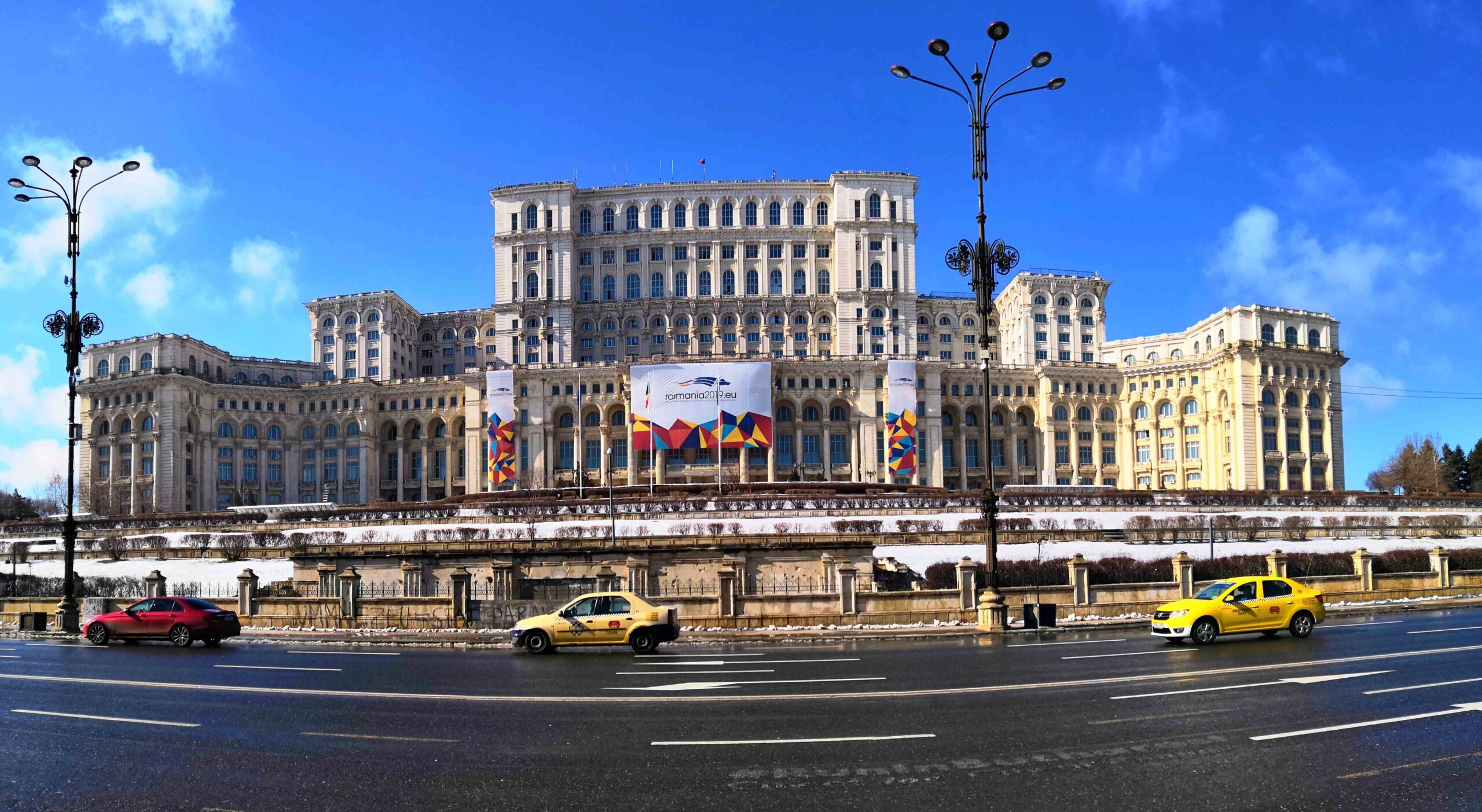The Political Landscape in Romania
Before going deeper into the topic, I would like to provide some basic information about the political system: Romania is a semi-presidential parliamentary democracy, meaning that the president functions as head of state, followed by the prime minister who precedes the government. The former appoints the latter with the approval of parliament, which consists of two chambers.
Since the fall of the communist regime in 1989, two parties in particular have dominated the political landscape. The first of these is the Social Democratic Party (Partidul Social Democrat, PSD), which grew out of the party that first came to power after the revolution. Embracing its origins, the party classifies itself as left-wing, though it adheres more to a right-wing ideology while retaining values such as a traditional orthodox family image. Its political “counterpart” is the conservative-liberal party, the National Liberal Party (Partidul Național Liberal, PNL), which represents the historically oldest party in present-day Romania (1875).
Since the 2020 elections, a third party has also managed to achieve surprising popularity: the far-right Alliance for the Unity of Romanians (Alianța pentru Unirea Românilor, AUR) party. Emphasizing its antagonistic opposition to the established parties, the latter defends nationalist and populist narratives such as reunification with the Republic of Moldova. The last party worth mentioning is the second conservative party in Romania, Uniunea Salvați România (USR), which gained popularity mainly due to its strong anti-corruption agenda.
The Weakening of the Romanian Legal and Justice System
One of the biggest reasons for the instability of Romanian democracy and the political system are the government’s repeated attempts to undermine the rule of law. These attacks appear to be primarily aimed at averting or even “legalizing” allegations of corruption and other violations by the political class.
In 2017, the government’s proposal – promoted by the Social Democrats – to turn abuse of power and corruption worth up to 200,000 euros into a non-punishable crime sparked protests among the population for weeks. Although this attempt was thwarted, it did not stop further attacks on the judicial system and the independence of the courts.
In 2018, for example, the PSD launched a bill to establish a new special unit for investigations against judges and prosecutors (SIIJ). This again sparked protests, as the existing special anti-corruption (DNA) and anti-organized crime (DIICOT) units, which had been successful in fighting corruption up to that point, were now stripped of their powers. Even though promises were made that after the takeover of the PNL these steps would be reversed, this has not been fully implemented to this day.
The Instability of the Romanian Government
Another point that always appears when discussing Romanian politics, is the instability of the government. Since 2014, there have been 13 changes of government and 17 different people have served as prime minister.
To give an example of those rapid shifts, it is worth looking at the events after the 2020 elections that lead to a political crisis in 2021:
Following already mentioned scandals concerning the justice system that were caused by the PSD, the 2020 elections provided a brief ray of hope. Although the Social Democrats won the elections, the Liberals’ votes were enough to form a coalition with the USR and the Hungarian UDMR party. This meant not only that the PSD was the direct opposition, but also that there would be finally a parliamentary majority close to President Klaus Iohannis. Therefore, many people hoped that this would eventually lead to reforms and a continued fight against corruption.
Unfortunately, disagreements arose between the PNL and the USR, leading to the dismissal of the USR Minister of Justice, Stelian Ion. This in turn caused the USR to leave the government and threatened a vote of no confidence, which was later successfully brought through by the PSD.
On the 4th of November, the PNL and PSD leaders met to discuss a possible coalition which was later this month confirmed by the parliament. Prime minister became the former General Nicolae Ciucă.
The example of this government crisis shows how quickly some coalitions in the Romanian parliament can break up and former rivals can become coalition partners.
Cliques and Corruption in the Political Class in Romania
The newly formed coalition between PSD and PSD also leads us to another reason that is often cited for Romania’s unstable situation: the opportunism within the Romanian party landscape.
The fact that Ciucă’s party presented itself as the opposition to the “corrupt” PSD during the electoral campaign, but nevertheless formed a coalition to ensure that the PNL stays in power, serves as an example that the PSD-PNL rivalry should be understood rather as a political show, than actual opposition. A lot of times the boundaries between the two parties’ blur and former political rivalries (and thus also one’s own political agenda) are forgotten in order to secure one’s own position of power.
It was repeatedly pointed out that both the PNL and the PSD lack a clear political direction, making their rapid shifts from opponents to coalition partners all too easy.
Even the exchange of party members between the two “rivals” is not an uncommon phenomenon. During the last elections, it was observed that officials switched from one party to another before elections, depending on which one had the best chance of winning.
Linked to this is the problem of the clientele system and corruption within the political class. Investigative journalists from “Recorder” showed, for example, that various employees of state institutions were hired without any competition, but only because of their affiliation with the PNL or PSD.
Another example was the recent plagiarism scandal of the Prime Minister Nicolae Ciucă. Both Ciucă and the education minister at this time, Sorin Cîmpeanu, were accused of having plagiarized their PhD Thesis. The Minister of Education had to resign, but the Prime Minister managed to escape the scandal. The judge, who ensured the charges against Ciucă were dropped, is rumored to be a friend and supporter of the general.
The Elections of 2024 – a Chance for Changes?
After looking at some of the issues that cause, among other things, the unstable political situation, we can conclude that they are mostly caused by the behavior of the political class. It almost seems that the political elite is aiming at perpetuating instability to ensure the blocking of actual reforms which could endanger and limit their power in the end.
This would explain the political antagonisms which are clearly mostly used to disguise and manipulate voters and the public, the constant attacks to the legal system and the rapid shifts in the government.
In 2024, when the parliamentary, local and presidential elections are due, it remains to be seen if the coalition between PSD and PNL will continue. Leaders of both parties have already commented on the possibility of cooperation. Although most experts assume that they will return to their old “rivalry” to stage a political agenda, given the growing danger posed by the AUR party, a continuation of the PNL-PSD coalition is still possible.
Therefore, if the described structures of political opportunism, cliques and corruption are not tackled, it is doubtful that the upcoming 2024 elections can bring any change.

